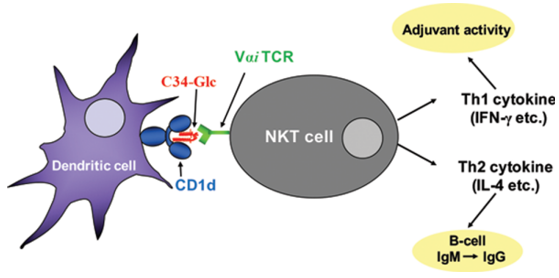Research Focus
Cancer immunotherapy is the therapy through modulation of patients’ immune system to fight against cancer cells. It includes in the regulation of immunosuppression used by cancers cells, involving antibodies or small interfering RNAs (siRNAs) targeting tumor-specific antigens or immune checkpoints. Tumor antigens consist of proteins or other macromolecules such as carbohydrates, specifically expressed by cancer cells. Immune checkpoints are crucial to maintain self-tolerance, which prevents immune system from attacking cells indiscriminately. However, cancer cells can evade immunosurveillance by stimulating immune checkpoint pathway.
In addition, cancer immunotherapy includes cellular immunotherapy and immunomodulators. Cell types used for immunotherapy are natural killer (NK) cells, lymphokine-activated killer cells, cytotoxic T cells and dendritic cells. Immune cells are removed from the donor, genetically engineered to express a chimeric antigen receptor (CAR) that specifically recognizes cancer cells, and then infused back into patients to attack their tumor cells. Immunomodulatory drugs can enhance (immunostimulators) or reduce (immunosuppressants) the immune response. Immunostimulators for cancer immunotherapy include recombinant cytokines, bacterial products, glycosphingolipids, and so on.
Discovery and further development of the immunomodulators from Chinese herbal medicine for cancer immunotherapy
α-Galactosylceramide (α-GalCer), the prototypical glycolipid antigen for natural killer T (NKT) cells, is presented by the MHC I-like CD1d molecule on antigen-presenting cells. After stimulation with α-GalCer, NKT cells secret large amounts of Th1 and Th2 cytokines, which in turn regulate many other
innate and adaptive immune cells. Thus, NKT cells regulate both innate and adaptive immunity involved in autoimmune disorders, microbial infections, and cancers. However, the anticancer effects of α-GalCer are limited in early clinical trial.
It provides promise to find out the natural glycolipids in herbs which can activate NKT cells directly. Potential glycolipid analogs will be developed to induce more Th1-biased cytokine secretions from murine and human NKT cells as well as better anticancer efficacy.
Immune checkpoint inhibitors (ICI) such as anti-programmed death-1 (PD-1) or programmed death ligand 1 (PD-L1) antibodies can restore immune cell activation. Thus, PD-1/PD-L1 blockade provides great hopes for cancer patients. However, not all patients have good responses to ICI. For example, only 30–40% of melanoma patients experience long-term benefits from anti-PD-1 antibody treatment. Activation of NKT cells can reinvigorate exhausted CD8+T cells in melanoma-bearing mice and colorectal cancer patients, which improves the treatment efficacy of anti-PD-1 antibody blockade in the anti-PD-1-resistant tumor model.


Kuo-Chen Yeh
Distinguished Research Fellow and Director
Director (2019.1.16-present)
Interim Director (2016.10.1 -2019.1.15)
Director/Coordinator of Molecular and Biological Agricultural Sciences program of Taiwan International Graduate Program (TIGP-MBAS), Academia Sinica (2015-2020)
Distinguished Research Fellow (2024-present)
Research Fellow (2014-2024)
Associate Research Fellow (2009-2013)
Assistant Research Fellow (2001-2009)
PDF Howard Hughes Medical Institute and Department of Biological Sciences, Stanford University, USA (1999-2001)
Ph.D. Plant Biology Graduate Group, University of California, Davis, USA (1994-1999)

